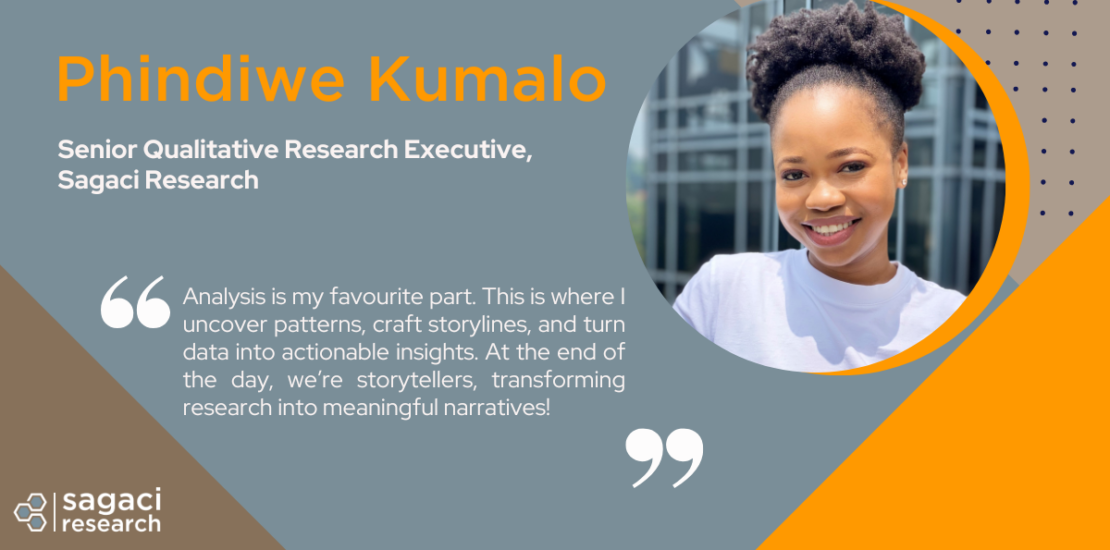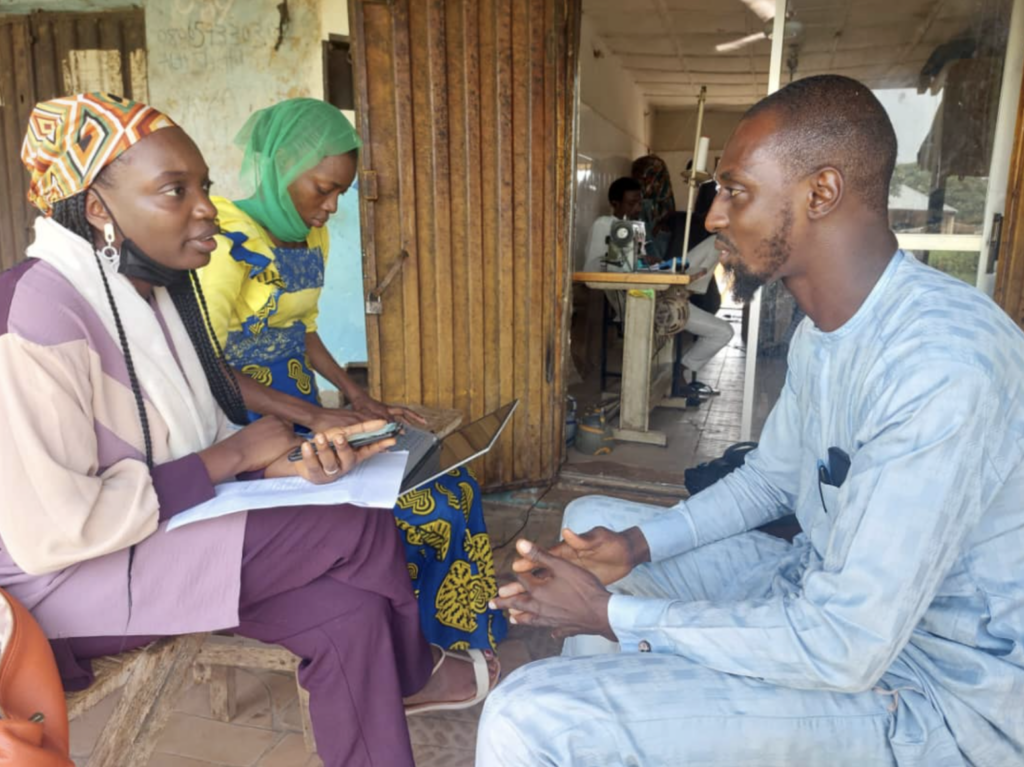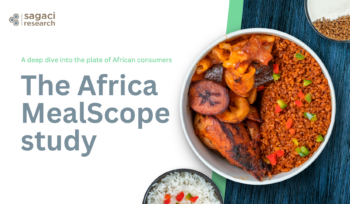- 17/01/2025
- Posted by: Jocelin Mondlane
- Categories: Articles, Qualitative Research, Sagaci Insights

Today, we sit down with Phindiwe Kumalo from the Qualitative team at Sagaci Research to explore the nuances of conducting qualitative research in Africa. From understanding diverse consumer behaviours to overcoming cultural and logistical challenges, she shares valuable insights into what makes this work both unique and impactful.
Q: Can you tell us about your role at Sagaci Research?
Phindiwe Kumalo: I am a Senior Research Executive in the Qualitative Research department, based in Johannesburg, South Africa. I have been working in research for the past 8 years and have had the privilege of working with Susana Costa’s team at Sagaci Research for the last 3 years. My role spans client interaction, project briefing, and creating research tools like screeners and discussion guides. I am deeply involved in moderation whenever possible and I handle analysis, which is my favourite part. This is where I uncover patterns, craft storylines, and turn data into actionable consumer insights in Africa. At the end of the day, we’re storytellers, transforming research into meaningful narratives!
Types of qualitative projects handled
Q: What types of qualitative projects do you handle the most?
PK: I work on a variety of qualitative research methodologies, including focus group discussions (FGDs), in-depth interviews (IDIs), in-home visits, ethnographies, or observations. We also conduct shop-along research to observe consumer behaviour in stores.
Additional research approaches
- Vox Pop: This method humanizes insights by engaging 5-10 participants with a few targeted questions. The resulting visuals and natural expressions provide valuable, actionable data that is shared company-wide. We have done quite a few recently, which were particularly insightful for our clients.
- Mystery Shopping: Though less common since COVID-19, this methodology provides detailed feedback on service quality.

In-Depth interview in Nigeria
Challenges in conducting Qualitative Research in Africa
Q: What is the biggest challenge when conducting qualitative research in diverse African markets?
PK: One concept that I learned long ago that summarizes these challenges pretty well is the ‘Project Management Triangle.’ Our work is always about balancing:
1) time
2) scope/quality
3) and costs
This can feel like a constant juggling act. Successfully managing qualitative research projects requires striking the right balance between meeting high client expectations and adapting to local realities. So this is where teamwork comes into play to ensure excellence without compromises.
Managing language barriers and cultural differences
Q: How do you manage challenges such as language barriers and cultural differences when conducting multi-country qualitative research in Africa?
PK: Maintaining consistent quality assurance across diverse markets is both a challenge and a priority. In countries outside our main hubs (Kenya, South Africa, Nigeria, etc), where we have in-house moderators, we rely on experienced local moderators in each region. They provide invaluable cultural context and ensure a localized approach. Their deep understanding of the local nuances adds authenticity and relevance to our research. To closely monitor discussions in all languages we typically set up simultaneous translation. We also generate daily top-line summaries so nothing is missed. This approach guarantees the quality and consistency of our qualitative insights across all African markets we cover.
Effective Qualitative Research methodologies in Africa
Q: What qualitative research methodologies are most effective in understanding African consumers, and why?
PK: Focus groups are particularly effective because of the strong collectivist culture in Africa. The concept of Ubuntu—”I am because we are”—highlights the importance of community in shaping individual identities. In focus group discussions, participants naturally build on each other’s ideas, sharing perspectives and experiences that create richer, more nuanced insights. This collaborative dynamic not only encourages openness but also provides a deeper understanding of shared cultural values, behaviours, and decision-making processes. It’s a methodology that aligns perfectly with the communal nature of many African societies.
Focus Group Discussion in Mozambique
Recent success stories: impact of qualitative insights
Q: Could you share recent success stories where your qualitative insights significantly impacted a client’s strategy in Africa?
PK: Certainly! For a leading global delivery platform, we conducted extensive concept testing in Africa, focusing on advert variations for food delivery, courier services, and grocery shopping. Each project built upon the previous one, allowing us to refine the concept further. Our insights eventually revealed a strong consumer preference for multi-category offerings, which significantly shaped their marketing and service strategy.
Similarly, for a prominent African media company, we worked on program evaluations to determine whether specific shows should be continued. Our qualitative research provided critical audience feedback, helping them make informed decisions about content direction and investment.
The importance of online qualitative research
Q: With the rise of COVID-19, online research methods, particularly in qualitative research, became more prominent. What is the significance of online methods in qualitative research today?
PK: We now use a combination of face-to-face and online research, with face-to-face methods being the primary approach. While I prefer face-to-face research for its ability to capture body language and non-verbal cues, online methods are valuable when budget constraints exist or for specific methodologies, such as longitudinal studies with a broad target audience. In these cases, we leverage our online consumer platform, SagaPoll, which reaches all 54 African countries. On top of that, the quantitative insights generated by the platform (SagaBrand, SagaCube, SagaShopper…) are a valuable complement to our qualitative approach, as we know that qualitative and quantitative research work hand in hand!
Shifting consumer behaviour across Africa
Q: What trends or changes are you seeing in consumer behaviour across Africa, based on your recent qualitative studies?
PK: Economic challenges are driving significant shifts in African consumer behaviour. Clients are increasingly interested in understanding how people are coping with rising costs. We’ve observed various strategies, such as buying in bulk to save money, cutting back on certain categories of consumption, and adapting spending habits rather than simply switching brands. What stands out is that there isn’t a one-size-fits-all approach—consumers are employing diverse and creative strategies to navigate tough times. Coping mechanisms for rising costs are varying greatly, and companies need to be aware of these evolving strategies to adjust their offerings.
Research in the age of Social Media
Q: What role does qualitative research play in helping clients understand consumer behaviour in the age of social media and AI (Artificial Intelligence)?
PK: All companies want to truly understand their consumers—hearing their voices and seeing their perspectives is essential. Qualitative research plays a critical role in providing that clarity. While social media monitoring and AI have made consumer opinions more accessible and patterns easier to analyze, they also create a lot of noise. AI can process vast amounts of data and identify trends quickly, but it often focuses on the “what” rather than the “why.” Qualitative research complements these tools by diving deeper, uncovering the full story behind consumer attitudes and behaviors. It helps cut through the noise, offering focused, actionable insights that go beyond surface-level data to enable businesses to make informed, strategic decisions.
Advice for companies conducting Qualitative Research in Africa
Q: To conclude, what advice would you give companies looking to conduct qualitative research in Africa for the first time?
PK: Prioritize quality while understanding Africa’s market diversity. Localize your approach to account for cultural nuances, language differences, and regional behaviours. Working with a single point of contact across all markets ensures consistency and helps maintain quality insights. Partner with African qualitative research experts who understand local contexts, as flexibility and adaptability will lead to more actionable results.
Thank you Phindiwe!
Want to know more about our qualitative research capabilities in Africa? Click below or email us at contact@sagaciresearch.com.




